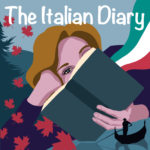
Silvana Saccomani, April 2021
As the child of Italian immigrants growing up in Canada I must have been about four years old when I first heard the word. One I would subsequently hear repeated hundreds of times over the years. M-I-S-E-R-I-A…a word so simple and harmonic sounding yet packed with tremendous emotion because it means “dire poverty” in English. My parents grew up in, miseria in Italy during the 1940s.
My Mom stored that word in her parenting toolkit. And whenever I was about to launch a “legitimate complaint”—like having to wear hand-me-downs, sharing a bicycle with my sisters, or walking the ten blocks to school—she would pluck miseria out of her toolkit and sit me down for a lesson on what dire poverty means: what it tasted and felt like and what it made people do.
Miseria, apparently, tastes bland. It has little variety. Regarding the dinner menu, if one evening polenta was served first followed by potatoes; then the next evening, potatoes would be the first course and polenta the second. Once a month, there was a meat dish, that is chicken or rabbit. But don’t get too excited: a 2 lb chicken would be divided into at least six small portions for six very hungry souls. There were never second helpings and so never a need to go on a diet.
Miseria, apparently, is rough to the touch. My grandmother—or Nonna as we call her in Italian—would take potato sacks and repurpose them into slips for my Mom and her sisters. But the fabric was so itchy the girls developed red rashes on their skin. My Nonno—or grandfather— meanwhile made the family’s shoes: a wooden clog sole with cardboard nailed on top for the uppers. They never came in exact sizes, so my Mom stuffed socks into the toes to make them fit. Un pair for person and only to go out in public.
Miseria, apparently, makes you weak and tired. My mom could hardly wait to go to daily mass because behind the dark veil that covered her face, she could doze off in peace. The month of May was my Mom’s favourite month. May is dedicated to the Blessed Virgin, offering an occasion to go to church twice a day, so two catnaps instead of the usual one. Fainting was another thing that happened during mass, and apparently, my mom and her twin took turns fainting.
Miseria, apparently, spares no one. Even the farm’s working mule, Gina, was weak from hunger. After a hard day in the fields in the heat, the poor animal could not make it up the last hill. My Mom and her siblings had to give her a little push, hoping none of the neighbours saw the need to help poor Gina.
Miseria, apparently, makes parents quick to anger. If, for example, you “wasted” a matchstick—meaning you used one too many, by lighting a candle to help make your way in the dark to bed, when that same matchstick was supposed to be saved for the next day to light the wood stove—you were disciplined: going to bed with no hot-water bottle to create warmth under the heavy damp woolen blankets.
Miseria, apparently, forces people to make big decisions. In my parent’s case, Miseria made them leave their homeland in search of a better life in Canada.
And finally, Miseria, apparently, has special powers over children: making them think twice before complaining and helping them understand how lucky they are.
END